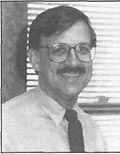 |
Home | Search | Browse | About IPO |
Staff |
Links |
A conversation with our readers
Readers:
|
|
More than a year ago, three of us sat around a table and discussed how terrific it would be if we could encourage some of Illinois' leading thinkers to put their thoughts together in a series of essays around a single subject. I was rather new to the magazine then, and had a good conversation with two veterans, Judy Everson, our editor of book reviews and humanities essays, and Caroline Gherardini, the editor. Our topic: Why is it that so many of our major institutions are struggling to adapt to changing times - in fields such as business, government, education and religion? Thanks in part to a grant from the Illinois Humanities Council, we begin in this issue to answer that question in a series of nine essays to be written by some of our state's best thinkers. Laying the foundation for this series is Douglas Wilson, a historian at Knox College in Gales-burg, who describes how we so frequently misread the past. |
The national health care debate features more story lines than anyone could possibly get a handle on. We hear a lot about costs, insurance and access to the health care system for everybody. Meanwhile, a few narrow-interest groups are lobbying for greater use of their own health care services, with the claim that what they provide is safe, medically appropriate and lower in cost than your family doctor. One of these groups is advocating greater access to acupuncture for Illinois citizens - specifically, access to acupuncture services by nonphysicians. Rick Wade, a good writer from Peoria, documents how the acupuncturists' efforts are faring and the opposition they're receiving from the medical establishment. We may be hearing about more of these kinds of philosophical conflicts as national efforts to get medical costs under control continue.
I also want to note the discussion about Chicago's third airport has not ended. Two guest columnists offer arguments declaring the new airport is an economic necessity.
I should mention that our offices moved in mid-December from one building to another on the campus of Sangamon State University in Springfield, from A Building to K Building (clever names for buildings, right?). It was a short move - just a few hundred feet - but one nonetheless that required a lot of planning, packing and computer hookups. So if we missed your phone call, it might have been because of the move. And if you come to see us, remember to visit the K Building.
Finally, I want all of your to know I appreciate your participation in our rather new "Question of the Month" series. We insert a tearout card in each magazine to give you a chance to comment on a current issue. It's not intended as a scientific poll, but it is some gauge of what Illinois residents are saying. The results of November's question about the '94 gubernatorial campaign are reported below.
Check out this month's tearout card, and send yours in today.
|
Netsch, Phelan, Burris draw some response The Question of the Month we posed to our readers in November 1993 was this: '94 ELECTIONS: Look ahead to the March primary. Which Democratic candidate (or potential candidate) for governor do you think would have the best chance of defeating Gov. Jim Edgar in November 1994? Why? Here is a breakdown of the 49 responses we received:
This is not a scientific poll, of course. Perhaps most interesting about the readers' responses were the additional comments they wrote to back their position.
Netsch boosters frequently made references to her candor and her understanding of state fiscal matters. One reader believes "she would get a lot of votes from Republican women."
Phelan backers were the only ones who mentioned fundraising ability, and they said he would do better at this than any of the other Democrats. While a couple a readers said they believe Phelan has the best plan for the state, one said succinctly that Phelan could beat Edgar, simply enough, "because of money." Period.
Several of those who named Burris suggested that he is the Democrat who would attract a broad range of voters -urban and downstate, black and white. He also has strong name recognition because of his many years in statewide office, they said. One reader from DeKalb summarized it this way: "He has been around for a long time and has a large and diversified support group with numbers and finances. He has also paid his dues by being in politics for many years. Being a minority will also not hurt him."
At the time our question was asked, Quinn had not announced which office he would seek. The three readers who mentioned him noted his "populist" reputation, but it turns out Quinn will run for secretary of state rather than for governor or for reelection as state treasurer.
A few readers seemed emphatic in writing that no Democrat could or would beat Edgar this year. Two readers who evidently back Edgar replied with the exact same words: "None, I hope."
The one reader who cast a split ballot for Netsch and Burris indicated a greater interest - simply of having Edgar defeated.
Ed Wojcicki
|
January 1994/Illinois Issues/3
|
|

